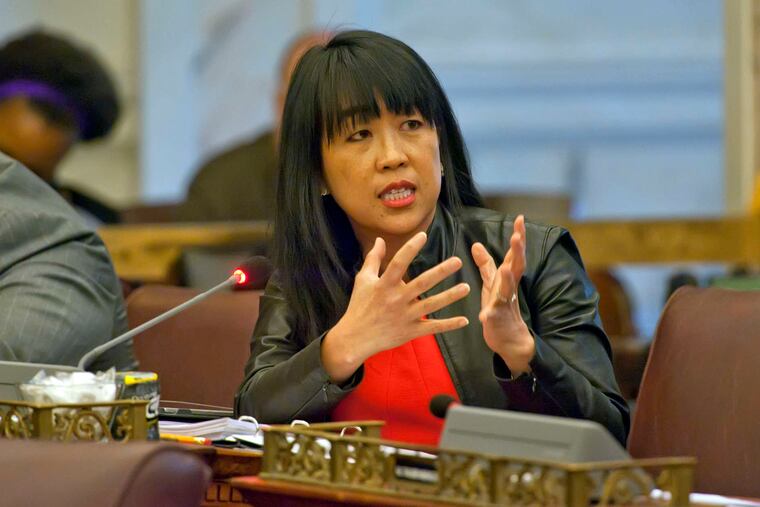School District may miss out on ride-sharing revenue
An agreement between Philadelphia, the Parking Authority, and ride-share businesses virtually guarantees that the School District will not see a financial benefit if a bill to regulate such services as UberX and Lyft is passed as written.

An agreement between Philadelphia, the Parking Authority, and ride-share businesses virtually guarantees that the School District will not see a financial benefit if a bill to regulate such services as UberX and Lyft is passed as written.
Under the tax structure proposed by the bill, ride-share businesses would likely have to generate much more money than anticipated to create enough taxable income for the schools to benefit. The structure is primarily designed to ensure that the Parking Authority will recover the cost - as much as $4 million - expected to be spent on regulating an estimated 15,000 vehicles used in ride sharing, a PPA spokesman said.
The point of the bill was to ensure that ride sharing had a legal framework in the city, said Brian Abernathy, a deputy managing director and a mediator in negotiations. Money to the district would have been a nice side benefit, but wasn't the goal.
"The city would love to see the School District get additional revenue, but this isn't a School District revenue bill," he said.
The legislation would formalize ride-sharing regulation statewide, and also make it legal in Philadelphia for the first time.
Advocates for the School District see the PPA enriching itself at the expense of city schools. Money from the Parking Authority to schools has declined by almost $6 million from the 2012 fiscal year to present, said City Councilwoman Helen Gym.
"Something that was supposed to be created to benefit schoolchildren has turned into something where the School District gets what's left after the Parking Authority takes its own cut," Gym said.
How much tax revenue ride sharing could generate is difficult to determine, because the companies don't make revenue public, and it's not likely the schools would see a big windfall - but the money would help, district spokesman Fernando Gallard said.
"This current bill eliminates a potential source of recurring revenues at a time when we have begun to stabilize our finances," he said in a statement.
The bill would establish a tax rate of 1.7 percent per ride for ride-sharing businesses. For a big company such as Uber, the first $2 million of tax revenue would go toward an operating fee paid to the PPA each year, and the next $2 million would also go to the Parking Authority. Only after UberX service generated about $235 million in taxable income - enough to surpass the $4 million threshold - would the School District be eligible to receive 50 percent of additional tax money.
UberX would likely not bring in anything close to $235 million a year. In data released last April, UberX reported giving one million rides in Philadelphia during its first six months of operation. If that rate held steady through a full year, the business would have to charge almost $60 per ride to even begin paying taxes beyond the PPA's $2 million fee. Industry representatives estimated that the average ride costs passengers about $8.
The PPA says it needs the $2 million to $4 million to cover the cost of regulating ride sharing, Abernathy said. The PPA did not explain how it arrived at those numbers when asked Monday night. The latest financial data for the agency, from March 2015, shows a 57 percent drop in operating income from the year before. The PPA still had $6.2 million in income.
Gym and other school advocates plan to question the PPA board at a scheduled meeting Tuesday morning.
The School District had hoped to see some revenue because a Senate bill assigned the district 66 percent of tax revenue. The PPA would have received 33 percent. But getting a bill past the House Consumer Affairs Committee proved to be a challenge.
At the end of April, the city, the PPA, and ride-sharing businesses were facing a time crunch. The city is the only place in the state where ride sharing is not regulated because of the PPA's unique status. The legislature was threatening to move on legislation that left out Philadelphia if the parties in the city couldn't come to an agreement. The PPA, the city, and ride-sharing companies agreed to the fee and tax structure that for the foreseeable future left out the district.
That bill is set to come to a vote on the House floor as soon as next week, said State Rep. Maria Donatucci, head of the Philadelphia delegation in the House. Legislators are now facing the choice of ending the regulatory limbo of ride sharing in Philadelphia, but at the expense of costing the district a small but needed source of income.
"The legislative process, it goes through a lot of processes, it's bound to change," she said. "I'm just hoping by the time we get to the final portion of the bill that it will benefit the Philadelphia School District."
215-854-4587 @jasmlaughlin